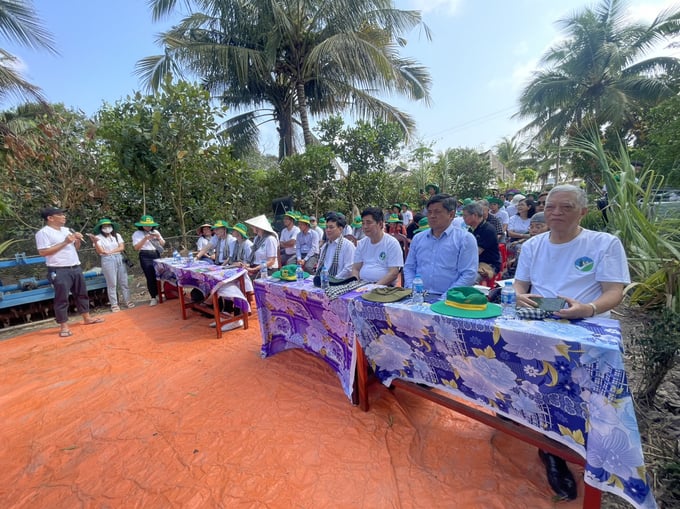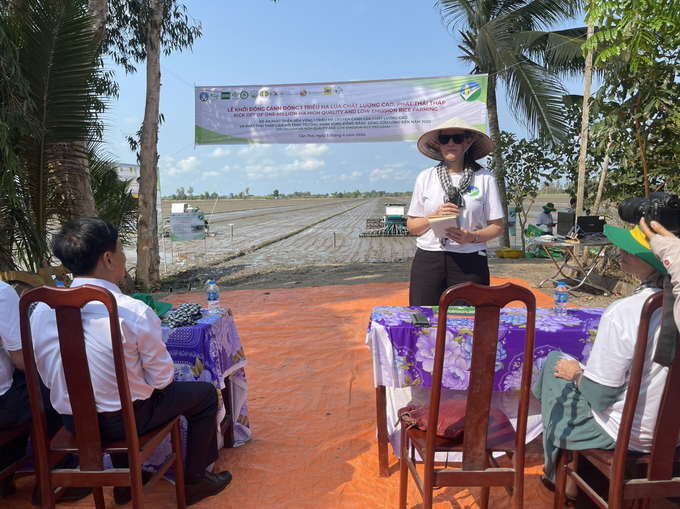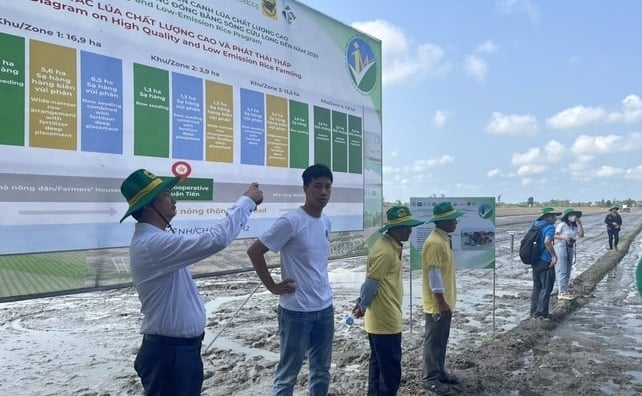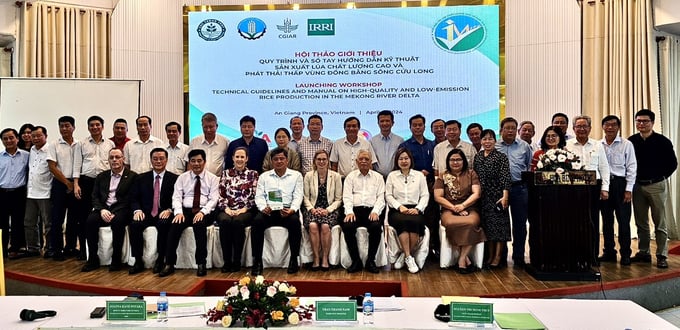May 16, 2025 | 10:21 GMT +7
May 16, 2025 | 10:21 GMT +7
Hotline: 0913.378.918
May 16, 2025 | 10:21 GMT +7
Hotline: 0913.378.918

Deputy Minister Tran Thanh Nam (2nd from right) and domestic and foreign delegates attended the Launching Ceremony of the 1 Million Hectare High Quality, Low Emission Rice Field at Thuan Tien Cooperative, Thanh An Commune, Vinh Thanh District, Can Tho City on April 5, 2024.
On April 4, 2024, in Long Xuyen, An Giang, the Department of Crop Production, in collaboration with the International Rice Research Institute (IRRI) and An Giang Department of Agriculture and Rural Development, organized a workshop to introduce the Technical guidelines and Manual on high-quality and low-emission rice production in the Mekong Delta.
Mr. Tran Thanh Nam, Deputy Minister of Agriculture and Rural Development; Mrs. Nguyen Thi Minh Thuy, Vice Chairman of An Giang Provincial People's Committee; Mrs. Joanna Kane Potaka, IRRI's Deputy Director General for Strategy, Engagement, and Impact; Representatives of sponsors and partners participating in the Project; Departments and Departments under the Ministry of Agriculture and Rural Development; Institutes, Schools, Associations, Private Enterprises, Cooperatives; International experts and organizations such as World Bank, Taiwan Development Cooperation Organization, New Zealand Embassy, FAO... Departments of Agriculture and Rural Development of 12 Mekong Delta provinces attended.
Mr. Le Thanh Tung, Deputy Director of the Department of Crop Production, presented the Project "Sustainable development of one million hectares specializing in high-quality and low-emission rice cultivation associated with green growth in the Mekong Delta until 2030".
The project has a significant meaning in orienting the transformation of sustainable rice farming methods and forming and developing large-scale, long-term, stable, concentrated raw material areas, ensuring the quality of sustainable and effective rice farming.

Mrs. Joanna Kane Potaka, IRRI's Deputy Director General for Strategy, Engagement, and Impact, spoke at the Launching Workshop.
Mr. Nguyen Van Hung, senior scientist at IRRI, introduced the process and technical manual for high-quality and low-emission rice production in the Mekong Delta. The process covers all stages of rice production, including cultivation techniques, harvesting, post-harvest treatment, and straw management.
The production technical components are interconnected and unified to form a complete and synchronous system, applied to rice production in the Project area, intending to reduce input costs by 30%, increase profit margins of rice growers, contribute to climate change adaptation, and reduce emissions.

Model of 1 million hectares of high-quality, low-emission rice field at Thuan Tien Cooperative, Can Tho City.
Mr. Cao Duc Phat, Chairman of the Board of Directors of IRRI, emphasized: "For more than 60 years, IRRI has always accompanied and effectively supported Vietnam to develop the rice industry. As far as I know, the Project of 1 million hectares of high-quality and low-emission rice is the first program in the world with the scale and approach of this Vietnamese program, which means producing high-quality rice at low emissions.
We see the Government, Ministry of Agriculture and Rural Development, and localities in the Mekong Delta region are interested and determined to implement. We have had a very positive step-by-step implementation. However, many technical, policy, and market issues still need to be resolved to create incentives and support for farmers with more than one million participating households and a strong workforce. There are many businesses, so we all need your joint support for the state, localities, and farmers."
Concluding the workshop, Mr. Tran Thanh Nam, Deputy Minister of Agriculture and Rural Development, emphasized: "The question is how to coordinate the implementation of the project? We hope that international organizations will coordinate to train farmers to implement the Project efficiently. Businesses, cooperatives, and localities need to participate actively in the Project."

Deputy Minister Tran Thanh Nam (holding Manual) and delegates at the Workshop introduced the Technical guidelines and Manual on high-quality and low-emission rice production in the Mekong Delta.
By organizing the Smart Rice Cultivation Program to adapt to climate change in the Mekong Delta for nearly 10 years, Binh Dien Fertilizer Joint Stock Company has contributed ideas to launch the Project of one million hectares of high-quality rice of the Ministry of Agriculture and Rural Development.
Mr. Phan Van Tam, Deputy General Director of Binh Dien Fertilizer Joint Stock Company, said: "With the motto of always being a companion of farmers, Binh Dien will actively participate in the Project of 1 million hectares of high-quality rice, developing Ministry's low emissions.
The Project requires reducing the amount of fertilizer by 30%, which has motivated businesses to invest in research and produce suitable products. Even in association and joint venture programs with partners, Binh Dien has met this requirement, specifically in the Smart Rice Cultivation Program to Adapt to Climate Change that Binh Dien has coordinated with the National Agricultural Extension Center and other partner units apply the cluster sowing method combined with buried fertilizer to help farmers achieve high economic efficiency and contribute to reducing greenhouse gas emissions.
Currently, Binh Dien and the National Agricultural Extension Center continue to organize smart farming in 5 provinces, including rolling straw, shredding straw, and applying products to process straw into organic fertilizer quickly in the field or as a growing medium for many crops.
Translated by Huong Giang

(VAN) Cold-barn systems efficiently manage environmental and temperature conditions, which aids in the prevention of respiratory diseases in pigs and protects them from the vectors that transmit African swine fevers.

(VAN) To tackle challenges, the project 'Addressing key technical bottlenecks in the grouper supply chain in Vietnam' has been underway since 2024.

(VAN) The project 'Disease-Resilient and Sustainable Cassava Production Systems in the Mekong Region', funded by the Australian Center for International Agricultural Research (ACIAR), is being implemented from 2024 to 2028.

(VAN) Data from 10,000 farming households will help professionalize production organization and support the implementation of the One Million Hectares Program for High-Quality, Low-Emission Rice Cultivation.

(VAN) FAO Director-General QU Dongyu marks International Day of Plant Health at NENA conference.

(VAN) Deputy Minister of Agriculture and Environment Hoang Trung affirmed that floriculture and ornamental plants are a growing industry that receives significant global attention.

(VAN) The three staple crops dominating modern diets – corn, rice and wheat – are familiar to Americans. However, fourth place is held by a dark horse: cassava.